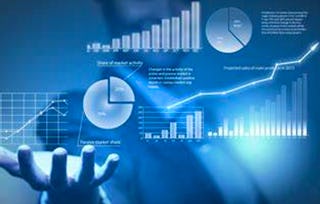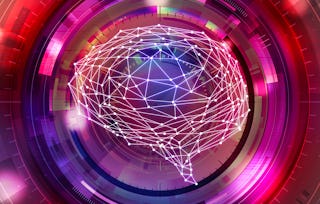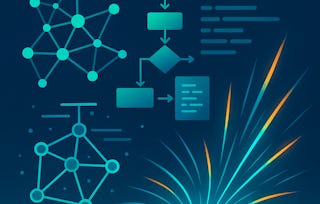Big data is the area of informatics focusing on datasets whose size is beyond the ability of typical database and other software tools to capture, store, analyze and manage. This course provides a rapid immersion into the area of big data and the technologies which have recently emerged to manage it.

Big Data Technologies

Big Data Technologies
This course is part of multiple programs.

Instructor: Yousef Elmehdwi
Included with
Recommended experience
What you'll learn
Understanding and identifying use cases and domains of Big Data problems
Selecting and implementing technical solutions involving Big Data systems
Develop and use various open source software systems (Apache) in the Big Data tech stack
Operate and run various cloud computing software services (AWS) in the Big Data infrastructure space
Skills you'll gain
- Distributed Computing
- Data Ethics
- Databases
- Apache Spark
- Data Lakes
- MongoDB
- Data Infrastructure
- Software Design Patterns
- Real Time Data
- Data Processing
- Data Management
- Big Data
- Informatics
- Apache Hive
- NoSQL
- Apache Hadoop
- Cloud Computing
- Data Storage
- Apache Kafka
- Apache Cassandra
- Skills section collapsed. Showing 13 of 20 skills.
Details to know

Add to your LinkedIn profile
54 assignments
See how employees at top companies are mastering in-demand skills

Build your subject-matter expertise
- Learn new concepts from industry experts
- Gain a foundational understanding of a subject or tool
- Develop job-relevant skills with hands-on projects
- Earn a shareable career certificate

There are 9 modules in this course
Welcome to Big Data Technologies! In Module 1, students will develop a foundational understanding of analytic data, its inherent value, and the methods to transform raw data into valuable insights. This module covers the challenges of handling large datasets, including their collection, processing, and analysis, while providing a comprehensive overview of Big Data's origins, properties, and real-world applications. Additionally, students will explore the economic, logistical, and ethical concerns associated with Big Data, alongside the professional advantages for data scientists proficient in Big Data analysis.
What's included
16 videos10 readings8 assignments1 discussion prompt
Module 2 introduces students to the challenges of building and managing distributed systems for big data storage and processing. It covers Hadoop’s origins, concepts, core components, and key characteristics, while exploring the Hadoop ecosystem's tools and services. Students will gain an understanding of distributed file systems, specifically HDFS, YARN's resource management, and various technologies for effective big data storage and organization.
What's included
13 videos7 readings6 assignments
In Module 3, students will explore the differences between processing small to moderate versus massive data volumes through distributed computing. This module covers the key concepts of the MapReduce framework, including how it breaks down large data processing tasks into smaller, parallel tasks for efficient execution. Students will also learn about the phases of MapReduce, the role of map and reduce functions, optimization patterns, and the benefits and limitations of various development approaches, including Java-based MapReduce and Hadoop Streaming.
What's included
18 videos8 readings7 assignments
In Module 4, students will explore Apache Spark as a powerful distributed processing framework for interactive, batch, and streaming tasks. This module covers Spark's core functionalities, including machine learning, graph processing, and handling structured and unstructured data, while highlighting its in-memory processing potential and unified nature. Students will compare Spark with MapReduce, learn about Spark's primary components, execution architecture, Resilient Distributed Datasets (RDDs), DataFrames, Datasets, and the various methods for creating and optimizing DataFrames for efficient data processing.
What's included
25 videos7 readings6 assignments
In Module 5, students will delve deeper into Spark's capabilities for data manipulation and transformation. The module covers essential operations such as selecting, filtering, and sorting data, as well as joining DataFrames and performing aggregations. Students will also learn about handling null values, using Spark SQL for data queries, and optimizing performance with caching. Practical applications include creating and manipulating DataFrames, executing transformations and actions, and efficiently writing data to various formats.
What's included
19 videos11 readings10 assignments
Module 6 introduces students to the limitations of batch processing and the significance of real-time data processing. It covers essential aspects of stream processing, including data ingestion and analysis, with a focus on tools like Apache Kafka for stream ingestion and Spark Structured Streaming for scalable and fault-tolerant data processing. Students will also explore various design patterns for organizing big data clusters, the concept of data lakes, and the Lambda Architecture for unifying real-time and batch data processing in modern data environments.
What's included
16 videos6 readings6 assignments
In Module 7, students will explore the benefits and limitations of relational databases in big data contexts and the concept of distributed database systems. This module covers NoSQL databases, their diverse data models, and their scalability and flexibility advantages. Students will also learn about real-world use cases, data partitioning, consistency models, and the CAP Theorem, gaining a comprehensive understanding of how NoSQL databases manage large datasets across clusters while ensuring scalability and availability.
What's included
18 videos6 readings6 assignments
In Module 8, students will explore specific NoSQL databases types – namely Key-Value, Wide-Column, and Document databases. Two similar systems, HBase and Cassandra, will be studied and contrasted in the context of the CAP theorem and associated CP/AP trade-offs. Topics such as consistency and availability will be discussed in the context of specific usage scenarios for both HBase and Cassandra – and general application domains of both systems will be highlighted. Finally, the document database MongoDB will be reviewed in the context of natural language/text processing use cases – and MongoDB usage and architecture will be analyzed with respect to traditional RDBMS.
What's included
9 videos4 readings4 assignments
This module contains the summative course assessment that has been designed to evaluate your understanding of the course material and assess your ability to apply the knowledge you have acquired throughout the course.
What's included
1 assignment
Earn a career certificate
Add this credential to your LinkedIn profile, resume, or CV. Share it on social media and in your performance review.
Build toward a degree
This course is part of the following degree program(s) offered by Illinois Tech. If you are admitted and enroll, your completed coursework may count toward your degree learning and your progress can transfer with you.¹
Instructor

Offered by
Explore more from Software Development
 Status: Preview
Status: Preview Status: Preview
Status: PreviewO.P. Jindal Global University
 Status: Free Trial
Status: Free TrialYonsei University
 Status: Free Trial
Status: Free TrialUniversity of Pittsburgh
Why people choose Coursera for their career

Felipe M.

Jennifer J.

Larry W.

Chaitanya A.

Open new doors with Coursera Plus
Unlimited access to 10,000+ world-class courses, hands-on projects, and job-ready certificate programs - all included in your subscription
Advance your career with an online degree
Earn a degree from world-class universities - 100% online
Join over 3,400 global companies that choose Coursera for Business
Upskill your employees to excel in the digital economy
Frequently asked questions
To access the course materials, assignments and to earn a Certificate, you will need to purchase the Certificate experience when you enroll in a course. You can try a Free Trial instead, or apply for Financial Aid. The course may offer 'Full Course, No Certificate' instead. This option lets you see all course materials, submit required assessments, and get a final grade. This also means that you will not be able to purchase a Certificate experience.
When you enroll in the course, you get access to all of the courses in the Specialization, and you earn a certificate when you complete the work. Your electronic Certificate will be added to your Accomplishments page - from there, you can print your Certificate or add it to your LinkedIn profile.
Yes. In select learning programs, you can apply for financial aid or a scholarship if you can’t afford the enrollment fee. If fin aid or scholarship is available for your learning program selection, you’ll find a link to apply on the description page.
More questions
Financial aid available,

